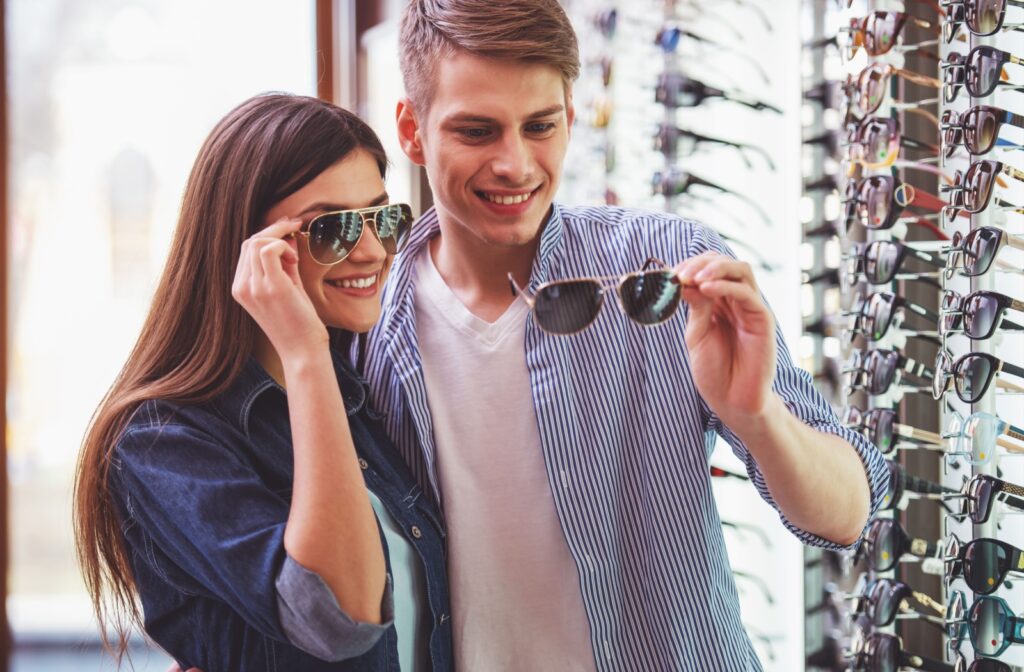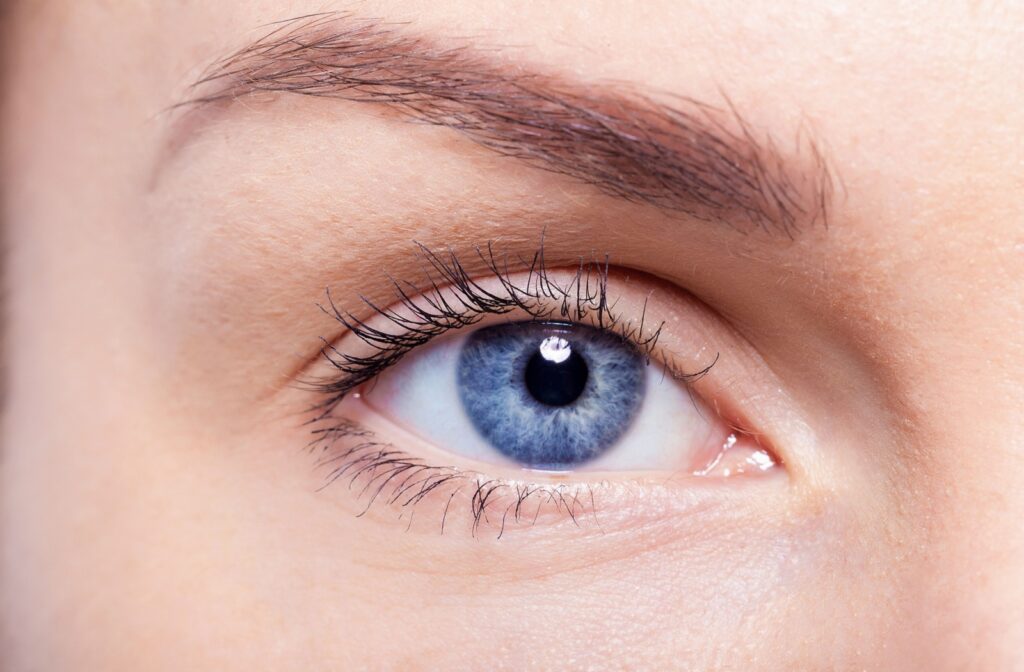The human eye is a lot more complicated than most people think. From your clear lens to your retina, plenty of tiny parts contribute to your overall visual system—like your eye color.
Your eye color plays an important role in how you perceive light. It’s determined by a special pigment that helps protect cells against UV radiation damage. Blue eyes have less of this pigment, so they’re often more vulnerable to bright light exposure. However, it’s important to remember that the eye is complicated, and color is one of many factors determining if you’re overly sensitive to light.
What Determines Eye Color?
Even though it’s beautiful, the sun isn’t harmless. It emits a special type of ultraviolet (UV) radiation that can quickly wreak havoc on the human body after prolonged exposure.
To protect itself, our body develops melanin, a pigment that gives color to our hair and skin. The more melanin your body has, the darker your eye color—while some people have more of this, other people have less.
People with blue eyes naturally have less melanin in their bodies while people with brown eyes have more. Melanin doesn’t just determine color—it directly protects your eyes against harmful UV rays.
What Causes Light Sensitivity?
Light sensitivity, or photophobia, is a common issue that can affect anyone. It’s that uncomfortable feeling you get when your eyes are exposed to bright light. It often causes:
- Squinting or closing your eyes
- Headache or migraine
- Watery eyes
- Burning or stinging sensation
- Needing to wear sunglasses indoors
This condition can develop due to plenty of potential reasons. Migraines, infections, dry eyes—these all can quickly cause a range of symptoms throughout the eyes. However, there’s one culprit often overlooked—photokeratitis.
What Is Photokeratitis?
When you spend too long out in the sun, your skin quickly becomes more sensitive. And if you prolong your exposure to UV rays, you’ll deal with a sunburn.
Photokeratitis is a sunburn that develops on the cornea—the clear dome-shaped tissue at the front of your eye. When you’re exposed to too much UV radiation, either directly or indirectly, this tissue can become inflamed and irritated.
Photokeratitis often causes:
- Pain or discomfort in the eyes
- Redness of the eyes
- Blurred vision
- Tearing or watery eyes
- Swelling around the eyes
This condition is a significant reason why people experience light sensitivity. Your eye is inflamed due to UV radiation, and bright lights cause further irritation. If you have a lighter eye color—like blue—you may be more susceptible to photokeratitis due to less protection against UV radiation.
The Dangers of UV Exposure
Whether you have blue eyes or brown, UV radiation still poses a significant threat. While the sun is a crucial part of life on Earth, it can significantly raise the risk of all kinds of conditions. It isn’t limited to photokeratitis and sunburns—prolonged UV exposure can lead to a higher risk of:
- Cataracts
- Macular degeneration
- Pterygium (a growth on the eye)
- Skin cancer around the eyelids
- Corneal damage
If you plan on spending time outside, it’s crucial to properly protect your eyes from the sun. Fortunately, it’s simpler than you may think.

How to Protect Your Eyes
Protecting your eyes is an important step—it means the difference between clear, comfortable vision and significant discomfort.
When you’re outside, make sure that you’re:
- Wearing a pair of 100% UV-blocking sunglasses: These come in both polarized and non-polarized forms depending on your preferences and are a simple way to prevent UV rays from reaching your eyes.
- Wearing a hat: A wide-brimmed hat can also provide additional protection against the sun’s rays, and keeps UV rays from reaching your eyes, skin, neck, and face.
- Taking regular breaks and keeping to the shade: Make a point to regularly step into the shade for a bit to give your eyes a break.
- Staying hydrated: Drinking plenty of water keeps your eyes lubricated and comfortable, reducing the risk of dry eye symptoms.
- Using artificial tears when needed: If you’re experiencing dryness or discomfort in your eyes, using over-the-counter artificial tears can help soothe them.
By taking simple preventive measures, you can significantly reduce your risk of photokeratitis and other eye conditions caused by UV exposure. Remember to take care of your eyes—they’re a vital part of your body’s overall health. Whether you have naturally light or dark eyes, UV radiation is a real threat, so it’s essential to be proactive!
Keep Your Vision Clear
Blue eyes might be more sensitive to light, but that doesn’t mean you can’t enjoy the sunshine. By taking simple precautions, you can protect your eyes and keep your vision clear and comfortable.
Don’t forget to visit our team here at Dr. Henslick Vision Center! We’re here to give you up-to-date advice on protecting your eyes from bright lights and sun. Book an appointment with us today, and let’s work together to keep your vision clear.



